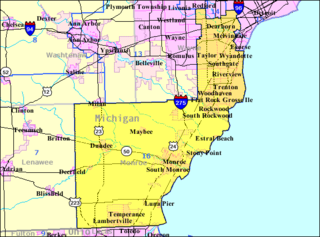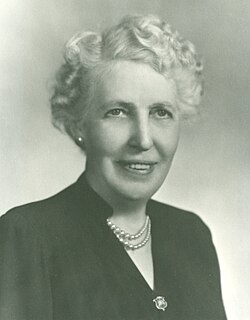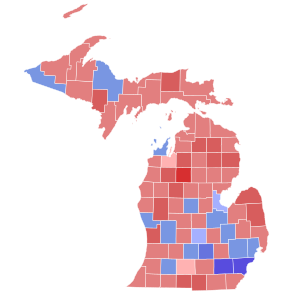| Elections in Michigan |
|---|
 |
Of the 19 Michigan incumbents, 18 were re-elected.
| District | Incumbent | Party | First elected | Result | Candidates |
|---|---|---|---|---|---|
| Michigan 1 | John Conyers | Democratic | 1964 | Incumbent re-elected. | √ John Conyers (Democratic) 88.4% Walter F. Girardot (Republican) 10.8% Nina J. Hubbard (AI) 0.5% Maceo Carl Dixon (Socialist Workers) 0.2% |
| Michigan 2 | Marvin L. Esch | Republican | 1966 | Incumbent re-elected. | √ Marvin L. Esch (Republican) 56.0% Marvin R. Stempien (Democratic) 43.3% Henry W. Kroes Jr. (AI) 0.7% |
| Michigan 3 | Garry E. Brown | Republican | 1966 | Incumbent re-elected. | √ Garry E. Brown (Republican) 59.2% James T. Brignall (Democratic) 39.9% Marvin P. Lightvoet (AI) 0.9% |
| Michigan 4 | J. Edward Hutchinson | Republican | 1962 | Incumbent re-elected. | √ J. Edward Hutchinson (Republican) 67.3% Charles Jameson (Democratic) 32.7% |
| Michigan 5 | Gerald Ford | Republican | 1948 | Incumbent re-elected. | √ Gerald Ford (Republican) 61.1% Jean McKee (Democratic) 37.7% Dwight W. Johnson (AI) 1.1% Frank Girard (Soc-Lab) 0.1% Alan Lee Maki (C) 0.07% |
| Michigan 6 | Charles E. Chamberlain | Republican | 1956 | Incumbent re-elected. | √ Charles E. Chamberlain (Republican) 50.6% Robert Carr (Democratic) 49.4% |
| Michigan 7 | Donald W. Riegle Jr. | Republican | 1966 | Incumbent re-elected. | √ Donald W. Riegle Jr. (Republican) 70.1% Eugene L. Mattison (Democratic) 29.9% |
| Michigan 8 | R. James Harvey | Republican | 1960 | Incumbent re-elected. | √ R. James Harvey (Republican) 59.3% Jerome T. Hart (Democratic) 39.4% John B. Lipinski (AI) 1.3% |
| Michigan 9 | Guy Vander Jagt | Republican | 1966 | Incumbent re-elected. | √ Guy Vander Jagt (Republican) 69.4% Lawrence H. Olson (Democratic) 29.5% De Loyd Glenn Hesselink (AI) 1.1% |
| Michigan 10 | Elford Albin Cederberg | Republican | 1952 | Incumbent re-elected. | √ Elford Albin Cederberg (Republican) 66.7% Benjamin D. Graves (Democratic) 30.9% Richard Friske (AI) 2.4% |
| Michigan 11 | Philip Ruppe | Republican | 1966 | Incumbent re-elected. | √ Philip Ruppe (Republican) 69.4% James E. McNamara (Democratic) 29.8% James P. Hoy (AI) 0.8% |
| Michigan 12 | James G. O'Hara | Democratic | 1958 | Incumbent re-elected. | √ James G. O'Hara (Democratic) 50.8% David Serotkin (Republican) 49.2% |
| Michigan 13 | Charles Diggs | Democratic | 1954 | Incumbent re-elected. | √ Charles Diggs (Democratic) 85.6% Leonard T. Edwards (Republican) 13.3% Raymond D. Moon (AI) 0.6% Nanci Kinker (Socialist Workers) 0.4% |
| Michigan 14 | Lucien N. Nedzi | Democratic | 1961 | Incumbent re-elected. | √ Lucien N. Nedzi (Democratic) 54.9% Robert V. McGrath (Republican) 45.1% |
| Michigan 15 | William D. Ford | Democratic | 1964 | Incumbent re-elected. | √ William D. Ford (Democratic) 65.8% Ernest C. Fackler (Republican) 32.9% Aldi C. Fuhrmann (AI) 1.3% |
| Michigan 16 | John Dingell | Democratic | 1955 | Incumbent re-elected. | √ John Dingell (Democratic) 68.1% William Rostrom (Republican) 29.8% Peter P. Gayner (AI) 2.2% |
| Michigan 17 | Martha W. Griffiths | Democratic | 1954 | Incumbent re-elected. | √ Martha W. Griffiths (Democratic) 66.4% Ralph E. Judd (Republican) 32.5% Hector M. McGregor (AI) 0.8% Christy L. Wallace (Socialist Workers) 0.3% |
| Michigan 18 | None (district created) | New seat. New member elected. Republican gain. | √ Robert J. Huber (Republican) 52.6% Daniel S. Cooper (Democratic) 47.4% | ||
| Michigan 19 | William Broomfield Redistricted from the 18th district | Republican | 1956 | Incumbent re-elected. | √ William Broomfield (Republican) 70.4% George Montgomery (Democratic) 28.6% Henry Lloyd George (AI) 1.0% |
| Jack H. McDonald | Republican | 1966 | Incumbent lost renomination. Republican loss. | ||










